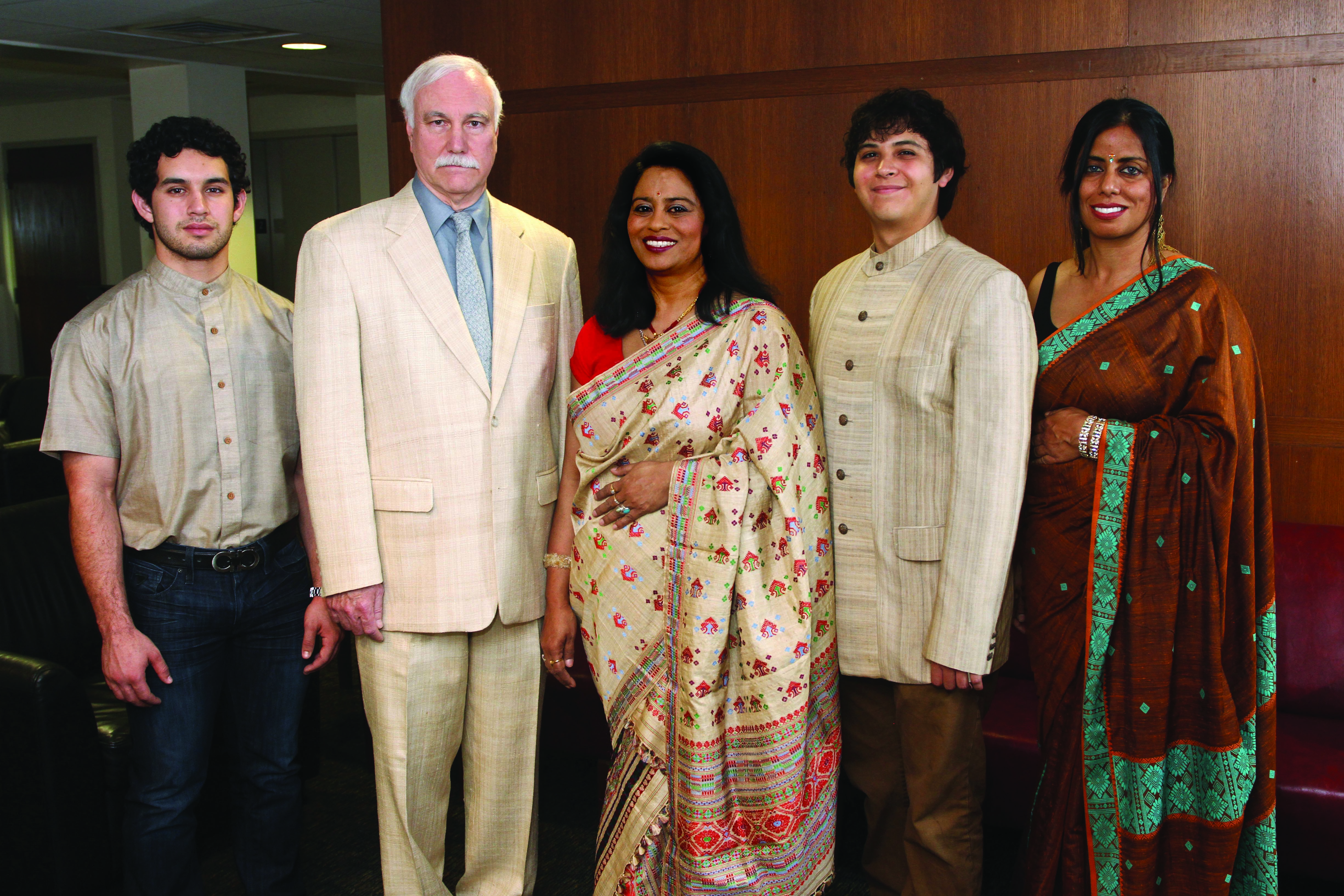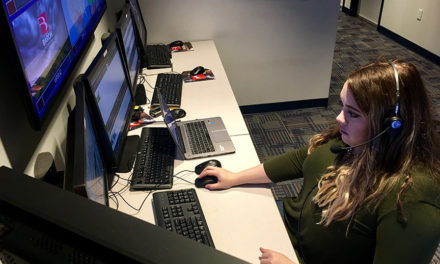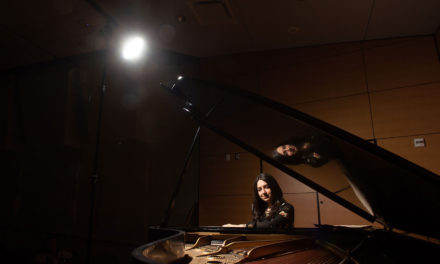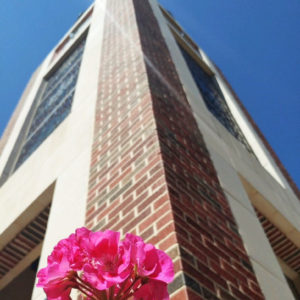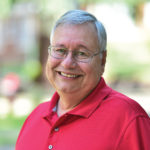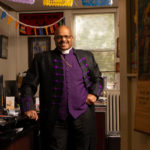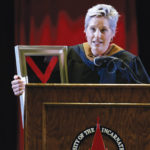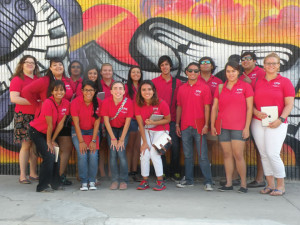
The inaugural group of Cardinal Community Leaders visit San Antonio’s Eastside as part of their Center for Civic Leadership orientation over the summer.
By Brance Arnold ’10 MA
The University of the Incarnate Word’s (UIW) tradition of cultivating tomorrow’s leaders to be concerned and enlightened citizens is deeply rooted in the Mission of its founders, the Sisters of Charity of the Incarnate Word. And UIW’s new Center for Civic Leadership (CCL) is reflective of the university’s many efforts in perpetuating this strong tradition.
In partnership with CHRISTUS Health, the CCL was established in the spring of 2013. It is designed to facilitate UIW’s faculty and students and CHRISTUS associates by serving as a clearinghouse for community contacts and expanding ways of becoming more socially aware of local and global community needs. The CCL aims to support the continuous efforts of UIW and CHRISTUS Health in meeting profound, social needs of communities. The center will facilitate not just main campus but UIW programs including ADCaP, the professional programs, and UIW’s locations in Mexico and Germany.
“It’s built on the service learning opportunities that have been actively offered here for almost 20 years,” said Dr. Dorothy Ettling, CCVI, CCL director. “Many faculty instituted community, field-based activities as part of their classroom experience and a lot of policy developed around those efforts.” Ettling indicated that in the past there lacked an infrastructure for supporting student service initiatives. The task of monitoring the activities has been the responsibility of faculty or Campus Ministry with oversight by the Office of the Registrar. Because it was dispersed over several departments, it’s been difficult to consistently track student service. Eventually, Campus Ministry assumed the role of overseeing the service requirement. However, as enrollment continues to increase, so does the responsibility of coordinating and monitoring service opportunities.
“It was getting very big and Campus Ministry is responsible for many things that happen at the university to strengthen the spiritual climate, service being one aspect,” said Ettling. “So there was a need for some additional support, not to centralize but to offer coordination and facilitation.”
Over the last few years, the initiatives to better track and coordinate the service requirement eventually evolved into creating a center of excellence, in line with the University Planning Commission (UPC). In 2012, UIW Provost Dr. Kathi Light appointed an advisory committee made up of administrators and faculty in order to establish and develop what is now the CCL.
During the committee’s planning stages, the idea of partnering with CHRISTUS seemed a logical extension of the initiative.
“Somewhere in the discussions emerged the realization that the congregation sponsored not only a strong institution of education both locally and globally, but we also sponsored a strong health care system, CHRISTUS,” said Ettling.
“UIW contacted us to assess our interest in a joint effort around developing the next generation of leaders in our communities,” said George Conklin, SVP and CIO of CHRISTUS Health and CCL board member. “This is a unique extension of the relationship from our traditional health care co-ministries into education and leadership development.”
Conklin said the partnership extends their efforts significantly by providing CHRISTUS associates the opportunity to work directly with the CCL and UIW, outside of a traditional educational relationship, in meaningful community projects.
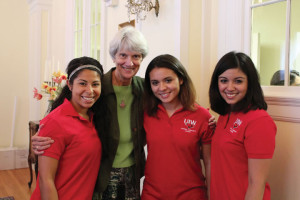
(Pictured L-R) Cardinal Community Leader Alixandra Pena; CCL Director Dr. Dorothy Ettling, CCVI; Cardinal Community Leader Astrid Tapia; and Cardinal Community Leader Tenna Montana pose for a photo at the Center for Civic Leadership open house on Aug. 22.
CHRISTUS currently holds two board seats on the CCL and is active in program development. Though CHRISTUS provided some seed funding, the CCL team seeks outside endowment for sustainability. UIW President Dr. Louis Agnese, who recognized the need for the CCL and initiated its implementation, has agreed to match endowment funds.
One of the first initiatives by the CCL’s advisory committee was to create something that would provide the center some visibility from the onset and establish a core of students that would represent what the center was about. Thus, the Cardinal Community Leaders program was born.
In the spring, a call for applicants was sent out to all first year students. Criteria was based on previous leadership experience and an ability to articulate the importance of being involved in the program and consisted of an essay and interview process. A pilot group of 16 was chosen.
The students participated in a weeklong summer orientation. A team including Dr. Tanya Stampfl, assistant professor of English, and two doctoral students assisted the pilot group during the orientation.
“Throughout the week we had discussions about Catholic social teachings, social justice, and leadership,” said Monica Cruz, who joined the CCL as associate director in July and is a UIW adjunct faculty member. “To connect them to the community we decided to start on the Eastside, near the UIW Bowden Clinic.”
The CCL reached out to a number of non-profits on San Antonio’s Eastside, including the Boys and Girls Club of San Antonio, the Ella Austin Center, Second Baptist Community Center, and the Healy Murphy Center, and coordinated a visit to the area where the students learned about the history and some of the social concerns of the Eastside. They were then asked to select one of the non-profits to work with throughout the remainder of the academic year. The students formed groups and chose a group leader who would act as the primary communicator with their respective organization.
The Cardinal Community Leaders were issued iPads to document and reflect on their service experience by creating iMovies, posting blogs, and using the technology to assist them with research and logistics.
“During our summer orientation, we made movies reflecting the weeklong experience that were then presented to some faculty members,” said Alixandra Pena, sophomore and Cardinal Community Leader. “That was an awesome experience to show them what we learned over the week and what our next steps would be in servicing the Eastside.”
Cruz stressed the importance of experiential learning and reflection in the community leaders’ experience. “The idea of reflecting about those issues that are important makes the service more meaningful,” expressed Cruz. “Our hope is that when they graduate they are aware of the world around them and continue with a life of service.”
Ettling said the plan is for the Cardinal Community Leaders to have a local experience this year and prepare for a global experience in the summer, most likely to be coordinated with UIW’s campus in Mexico, Centro Universitario Incarnate Word (CIW).
“It is such an honor to be a part of the first Cardinal Community Leaders organization,” shared Pena. “To be able to help build this organization from the ground means so much more because we build the traditions of the CCL and not just be a part of them.”
Pena also points out that the Cardinal Community Leaders want to open their community service projects to the rest of the student body. “When it comes to big projects we may need more hands to help and students can earn service hours,” she said.
Ettling said that research is showing that students enter college extremely excited and motivated about making a difference in the world but that idealism seems to decrease while they continue on to graduation, perhaps being that those ideals have not been nurtured while attending college.
A recent study commissioned by the Department of Education showed that among first-year students, 43.3 percent strongly agreed that their campus actively promoted awareness of global social, political, and economic issues, but only half that number of seniors strongly agreed.
Ettling believes that this strengthens the importance of the CCL as a need in higher education today, along with the essential roots of the enter in the Mission and legacy of UIW, CHRISTUS Health and the Sisters.
“There has been a real call to higher education to educate concerned and enlightened citizens in the context of safeguarding our democracy,” said Ettling. “It comes from the heritage of our Mission and our country.”
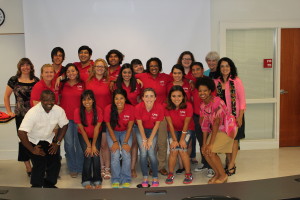
Dr. Tanja Stampfl (top left), assistant professor of English; Fr. Justin Udomah(bottom left), doctoral student; Sr. Dorothy Ettling, CCVI (top right), director of the Center for Civic Leadership; Monica Cruz (middle right), associate director of the Center for Civic Leadership; and Wanita Mercer (bottom right), doctoral student; share a photo with Cardinal Community Leaders in the Gorman Building on Aug. 2. The Center for Civic Leadership hosted theinaugural group of Cardinal Community Leaders from July 29-Aug. 2. The group of 16 return sophomores engaged inleadership development and community service activities.


